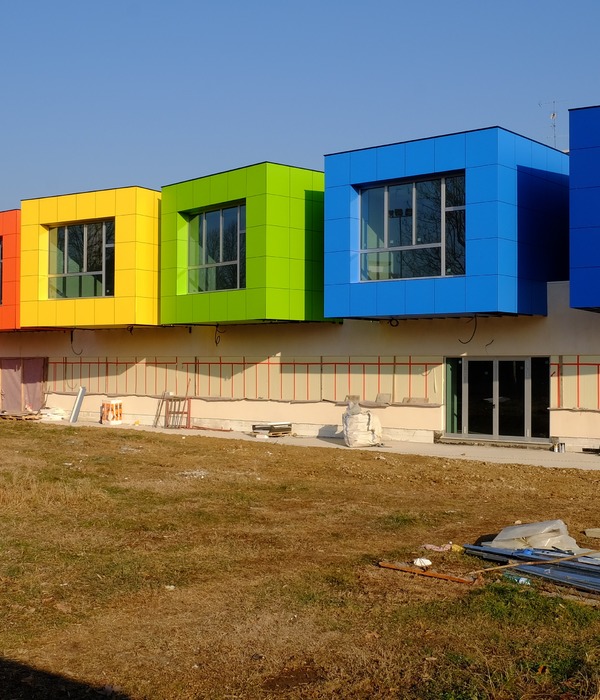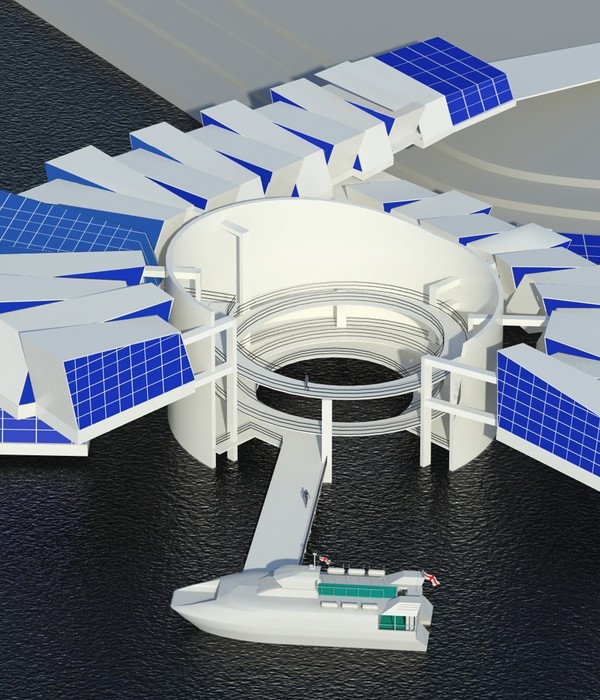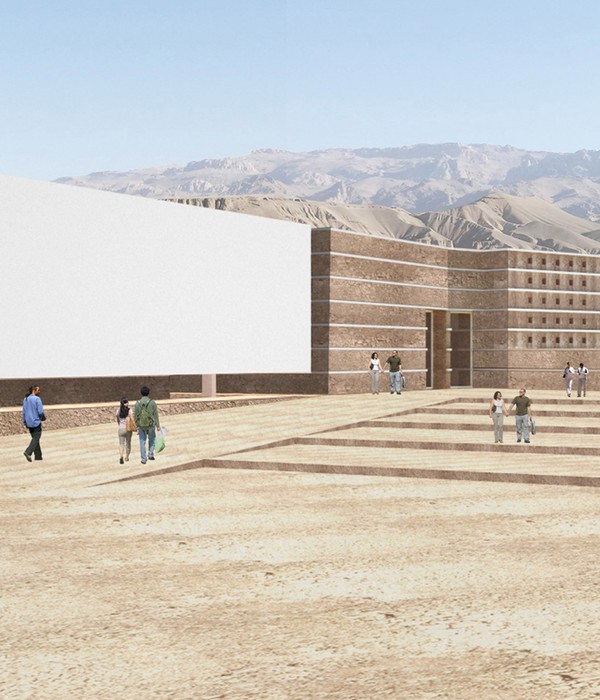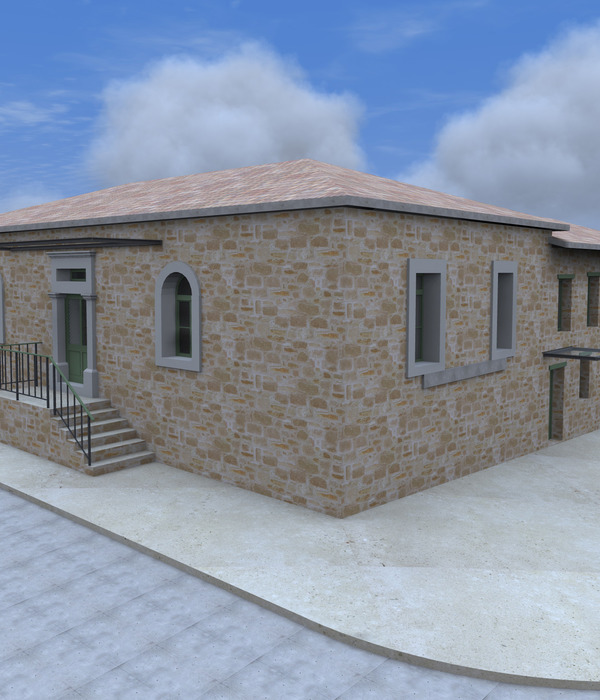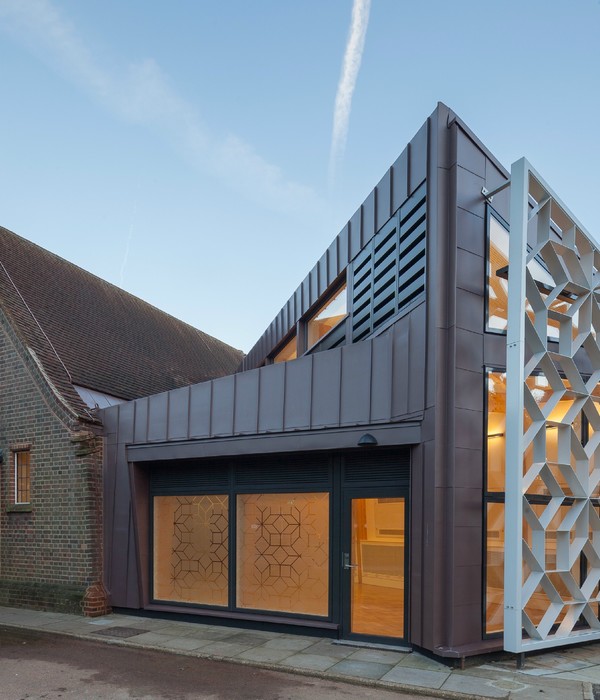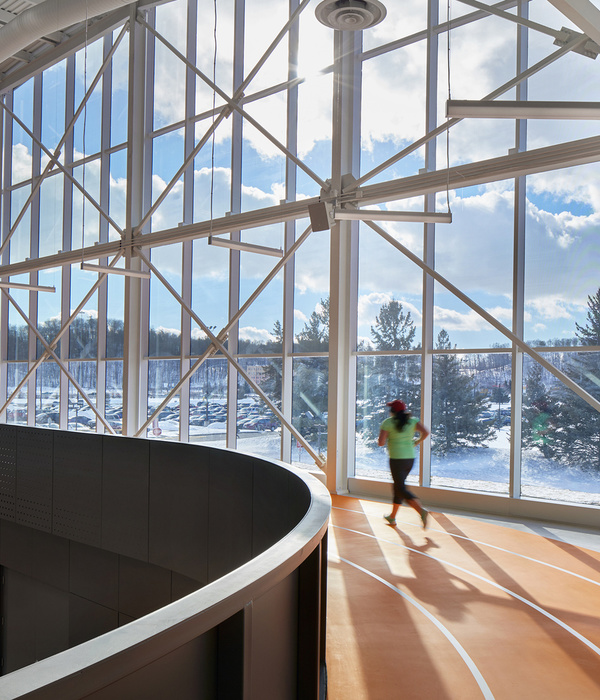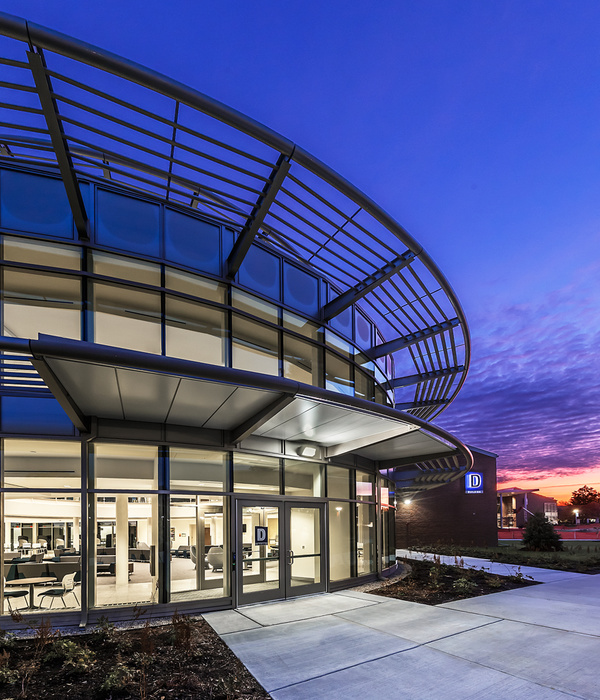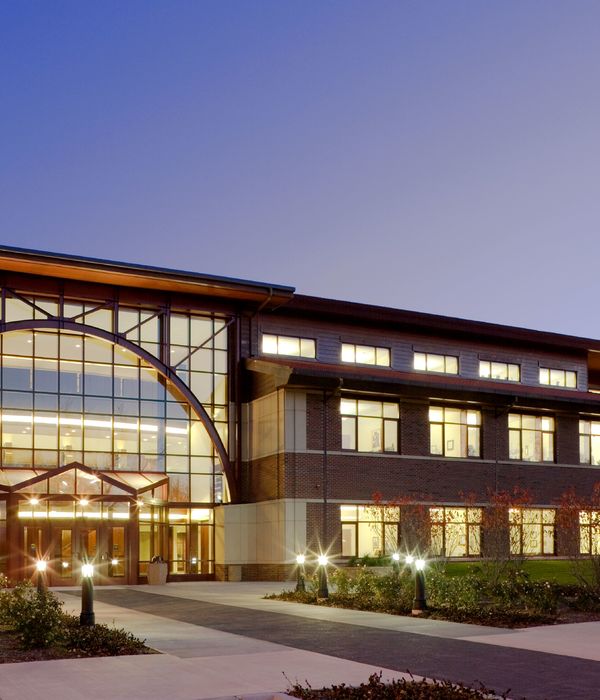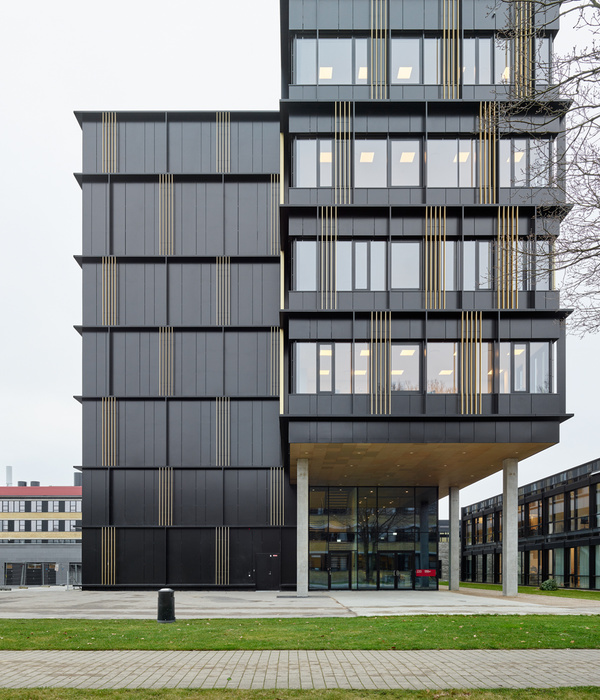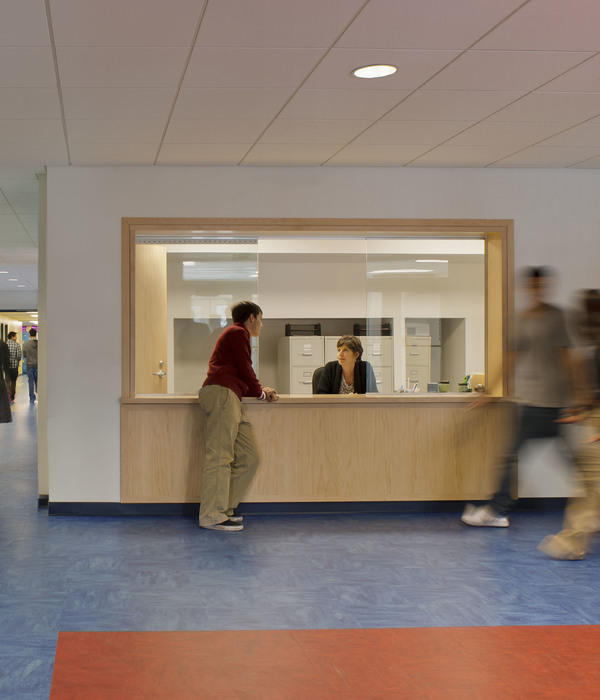梦工场是程宗灏先生为深圳留下的文化遗产。在梦工场建成后的 18 年间,其周边环境经历了骤变。如今,一座城市公共剧场,跨街之隔 18m 处便是居住社区的落位,引人发问。而原本作为半室外剧场的梦工场,也因演出时声音的扰民问题被投诉。在停止运营 5 年之后,政府重新立项,梦工场也迎来了改造的时刻。
Theater of Dream was originally an important public building, a great cultural legacy for Shenzhen left by architect Cheng Zonghao.18 years after its completion, radical changes have taken place in the surrounding urban environment. Today, an urban public theater situating only 18 meters away from the residential community is bound to raise issues on urban planning. As a semi-outdoor theater, it received repeated noise complaints during performances. After stopping operation for five years, the government decided to re-launch the project, and thus Theater of Dream ushers in the moment of rebirth.
▼建筑概览,Preview©郭靖
梦工场的基本体量,由扇形的主楼和三角形的配楼组成,主楼作为剧场看台,高层配楼整合舞台,课室,办公等辅助用房。两者一前一后的体量关系,与这座热带城市的茂密植被,共同定义出一处质量特殊的外部空间。
改造前的主楼,是一座没有气候边界的半室外剧场,类型上如同深圳早期的“大家乐”舞台,也像是一座希腊剧场。站在看台的最高点,场地致密的植被与城市景观尽收眼底。
Theater of Dream is basically made up of a fan-shaped main building and a triangle-shaped side building. The main building is used as the grandstand, while the high-rise side building integrates stage, classrooms, offices and other subsidiary rooms. With the side building standing behind the main building as well as the dense plant cover of this tropical city, an urban public space with special character is defined.
Before renovation, as a semi-outdoor theater without climate boundary, the main building resembled a Greek amphitheater. Stepping on the highest point of the grandstand, a panoramic view of the thick vegetative-cover embracing the entire site as well as the city landscape is perceived.
▼梦工场体量关系,The Volume of Theater of Dream©丘建筑设计事务所
▼改造前街角视点,View from the Street Corner before Renovation©丘建筑设计事务所
我们面临的核心问题,并非像欧洲城市里,在稳定城市秩序下的建筑单体讨论,而是在城市“增量时期”遗留的问题中,通过建筑单体的机会,重新建立场地秩序,弱化上层规划遗留的问题,在“存量阶段”的城市空间里,让实体空间重新建立和解。
需要改造的不是建筑单体,是与建筑单体接驳的整个城市空间。
The critical task is not the discussion of a single building under the stable urban context in most European cities, but to reset the order of the site and efface historical problems left from the “incremental period” of urban planning, trying to take full advantage of this renovation opportunity to arrive at a new reconciliation of urban spaces in its “stock period”.
What calls for renovation is not only the building itself but the entire urban space bordering the building.
▼左:改造前剧场看台;右:看台与城市 Left: The Grandstand before renovation; Right:The Grandstand and the City©丘建筑设计事务所
改造的动作从剖面开始,原本最低点仅 4m 净高的看台空间,已无法满足一座当代剧场对声光电的专业需求。我们在抬高屋面净高的同时,让气候边界退后,在城市空间与建筑界面之间,产生连续的,有空间进深的城市敞廊,在广场和建筑之间,建立起一组舞台与看台般的,城市空间的观演关系。
The strategy of section triggers the design process. Originally the height on the highest point of the grandstand was only 4 meters, which could not satisfy the demand for professional sound and lighting equipment in a modern theater. While lifting the height of the roof, we push the climate boundary inward by introducing a continuous city loggia with a space depth that builds up a “stage-grandstand” viewing dynamic between the building and the square.
▼左:树木掩映下的“山石”;右:改造前剖面 Left: A“mountain rock”sheltered by trees; Right: Section before Renovation©丘建筑设计事务所
13 米高的公共敞廊,作为组织剧场进入的必要流线,也是城市空间的延伸:敞廊与两侧大台阶贯通,连接至广场,在城市中塑造出立体的环形公共流线,也让建筑在与城市公共资源的整合中,放大了自身的价值。
As the necessary route to enter the theater, the 13-meter-high public loggia is also an extension of the urban space: The loggia connects to the large stairs on both sides and extends to the square, which forms a three-dimensional public circulation in the city. In this way, the single building augments its own value by integrating urban public resources.
▼城市敞廊与植被 工作模型,City Loggia and Plant Cover (Working Model)©丘建筑设计事务所
敞廊 13 米高的柱列,沿主体量扇形轮廓展开,以竖高的比例,“站立”在坚实的基座上,在视觉上刻画出一组恰当的重力关系。同时,柱列纤细的尺度,减少了体量对居民楼的压迫感,也在树木掩映的景观中,刻画着建筑与“自然”的关联。
The 13-meter-high column sequence in the loggia spreads along the fan-shaped volume with a gesture of “standing proportion” on a solid base, which visually evokes a proper sense of gravity. Besides, the slender columns alleviate the oppression of its scale on residential buildings and delineate the relationship between architecture and “nature” in the landscape shaded by the green trees.
▼下午时刻,In the Afternoon©郭靖
敞廊背后的金属幕墙系统,由压弯成反弧形的不锈钢板,和竖向幕墙扣件“编织”而成,在体量正向的弧线轮廓上,“积分”出光线微妙的变化,让圆形体量对测高光的捕捉更为敏感。
Behind the loggia, the metal curtain wall is “woven” by the negative arc-shaped stainless steel sheets and vertical mullions. The metal curtain wall incrementally mark the subtle changes of light along the frontal arc-shaped contour of the building, and renders the circular volume more sensitive in catching highlight.
▼黄昏时刻,In the Gloaming©郭靖
▼正反弧线对光线的“积分”©郭靖
The Ray of Light Reflected by Positive and Negative Arc
幕墙龙骨的间距尺度,是介于比例”与“图案”的中间状态,配合金属板穿孔尺度的控制,在城市不同的视看距离下,呈现出敏感的气质变化:远观,金属板的孔隙相对弱化,在敞廊柱列和幕墙龙骨的划分下,让主楼在城市中呈现坚实、肯定的比例;近处,板材的孔隙放大,与具有一定密度的竖向龙骨,编织成一幅“透气”的图案,在茂密的树冠中,产生与景观相关的尺度感。
The spacing of the mullions on the curtain wall falls between the impressions of “proportion” and “pattern”. Together with the perforations on the metal sheets, they create subtle perceptual variations at different distances. Viewed from afar, the perforations are less obvious, and the partition by the column sequences and mullions give the main building a solid and affirmative image in the city; at close range, the perforations become more manifest, which form a “breathing” pattern with the relatively dense array of mullions , so as to develop a landscape-related sense of scale among the thick crown cover.
与景观,(Medium Shot) Curtain Wall and Landscape©郭靖
▼近处,幕墙与景观,Curtain Wall and Landscape©郭靖
幕墙竖向的比例,在底部以一道连续的水平檐口结束,2.8m 高的连续檐口,在城市尺度的敞廊里,创造出一处与身体尺度相关的檐下空间,带来身体与城市尺度并存的张力。
The vertical curtain wall ends up with a continuous horizontal canopy at the bottom. The 2.8-meter-high canopy creates a proper scale of human body to accommodate the coexistence of urban and human scales and thus brings a certain degree of tension.
敞廊,金属“物体”,碗体 The Corridor; Metal curtain wall; The Bowl©郭靖
主楼与配楼在城市中一凸一平的体量关系,让主楼成为表演者,配楼退为背景。“沉默的表情”,是刻画配楼整体语言所拿捏的分寸。
Due to the volume position between the main and side building, the main building takes on the role of the “performer” while the side building retreats into the “background”. “A silent expression” is properly given to the side building.
▼改造前主楼与配楼关系©丘建筑设计事务所 The Relationship between Main and Side Building before Renovation
▼主楼与配楼关系 工作模型©丘建筑设计事务所 The Relationship between Main and Side Building (Working Model)
改造后,配楼以不提示尺度的颗粒状涂料均匀覆盖,仅通过水平向构造缝的帮助,刻画出地层般的层积关系,让配楼与碗体,成为这座热带城市中,一座沉默的“山石”。
After the renovation, the whole side building is painted with granulose plaster without any indication of scale. The horizontal joints on the solid volume evokes the association to the layering of the earth. The whole volume is perceived as “hill stone” in a tropical city.
后配楼与主楼关系©郭靖 The Relationship between Main and Side Building after Renovation
▼改造后配楼与主楼关系(施工过程照片)©丘建筑设计事务所 The Relationship between Main and Side Building after Renovation (Construction Site Photo)
▼改造后配楼与主楼关系(施工过程照片)©郭靖 The Relationship between Main and Side Building after Renovation (Construction Site Photo)
▼改造后配楼,Side Building after Renovation©丘建筑设计事务所
▼配楼与街道夹角©丘建筑设计事务所 Intersection Angel between Side Building and Street
▼通风孔隙,Ventilation Cells©丘建筑设计事务所
▼改造后配楼中庭©丘建筑设计事务所 Atrium in Side Building after Renovation
梦工场非正交系统的体量关系,已无法清晰划分地面与建筑的界线,在城市空间中,仿若从地面生长出的一组“物体”,带有强烈的景观属性。我们试图尊重这种强烈的性格,利用场地设计的机会,重新梳理这些“物体”与城市界面的关系。
Due to the non-orthogonal system of its complex volume, there is no distinct boundary between the ground surface and the building. The volume rises like a cluster of “objects” breaking through the soil with a strong sense of landscape. We attempt to retain this intense feature and try to integrate these “objects” into a new order of urban space.台阶与碗体关系 – 改造前(左)和施工过程(右)©丘建筑设计事务所 The Relationship between the Large Stairs and the Bowl before Renovation (left) & construction photo (right)
我们在广场边界一侧,整理花池界面,加建水平长廊。在纵深向的空间中,线性的长廊以洗练的语言与褶皱的表面互为观演,犹如园林中廊与假山的“对仗”。锋利的檐口,提炼出茂密树木的景观姿态,并在社区街道与公共广场之间,提示出领域感的划分。
在广场的另一侧,我们清理掉原本封闭广场边界的花池,让“物体的表演”在开放的广场空间被充分释放。同时,通过大台阶轴线角度的转向,让原本直接通往人行道的剧场大台阶,与广场建立更充分的流线关系。台阶的第一跑体量与碗体连接在一起,使得碗体自我孤立的“物体”轮廓,在城市底层空间,转变为相对开放的城市界面,提示出明确的空间方向,对城市与剧场人流的疏导,更为欢迎。
On one side of the square, we construct a new horizontal long canopy along the original flowerbed. The sharp horizontal line of the canopy engages in a dialog with the complex volume, which could be an analog to the relationship between “Pavilion” and “Stone” in traditional Chinese gardens. Meanwhile, the canopy also implies a “boundary” between the residential area and the public square.
On the other side of the square, we demolish the flower bed which initially blocked the boundary of the square, so as to allow the volumes to fully play out as “objects” in the open square.
Besides, by rotating the angle of the large stairs along the street, a more welcoming gesture to the square appears. With the flight of the new stair aligning with the curve of the Bowl on the ground level, the perception of the base is subtly changed from a self-isolated “object” to a relatively open city interface while providing smoother flow channels.
▼左:曲线山墙,碗体,配楼;右:山墙背后的直跑楼梯(施工过程)©丘建筑设计事务所 Left: Curve Gable Wall, The Bowl, Side Building; Right: Straight Flight Stairs behind Gable Wall (Construction Site)
与“山体”有关的体验从广场开始,经由一系列地形化的楼梯空间转场,在空间收放与明暗交错中,塑造出如登山般的体验,通过不同平台标高的视线引导,强化着建筑与城市空间的“观演”关系。
Starting from the square, we set out on a condensed “mountain-climbing” journey. Spatial transition initiated by various stair platform elevations gives a mountaineering experience through the interchange of light and shade and rhythmic scales, highlighting a “performing-viewing” dynamic between the building and urban space.
攀登空间序列,Climbing Spatial Sequence©丘建筑设计事务所
▼9.3m 敞廊标高视线(施工过程照片)©丘建筑设计事务所 Sight on 9.3-meter-high Loggia (Construction Site Photo)
▼向城市敞开的前厅(施工过程照片)©丘建筑设计事务所 Grand Entry Opening into the City (Construction Site Photo)
“山石”内部的空间,沿线性前厅向两侧延伸,将人流引导至过厅与楼梯厅,并在不同的标高进入整个流线的末端 —— 剧场看台空间。而原本碗体内部被弃置剩余的空间,在改造后作为夹层使用,与剧场看台空间相连。
The interior space of the “hill stone” flanks the grand entry and extends on both sides, directs the crowds to the hallway as well as stair hall, and finally guides them to access the grandstand at different elevations. The previously deserted space inside the Bowl now serves as a mezzanine after renovation and connects to the grandstand.
▼改造前未使用的夹层空间 Untapped Mezzanine before Renovation©丘建筑设计事务所
梦工场的空间,可以理解为一组地形关系中的“挖空”与“覆盖”。场地设计由外至内贯穿,体验始终被地形的线索牵引,模糊了场地与建筑惯常的区分,顺应原建筑强烈的性格,塑造出一系列与“山石”有关的,连续的空间经验。
The spatial strategy of Theater of Dream can be understood as “hollowing-out” and “covering” among a series of landforms. Throughout the entire space, experience is accentuated by the strong indication of a “terrain”, blurring the boundary between the site and the building, retaining the intense feature of the original building, and shaping a sequential space experience in relation to the “hill stone”.
▼夹层空间 效果图,Mezzanine (rendering)©丘建筑设计事务所
地形与覆盖的关系,在城市转角的树冠开口被释放,形成建筑面向城市的一张“正脸”,也是梦工场最为重要的观看视点。
敞廊与基座的比例关系,需要被着重刻画。
在半室外的敞廊,地面的雨水被引导至碗体边缘连续的排水沟,借助此处构造设计的机会,将栏杆与灯具杆件整合考虑,形成次级比例系统。
所有竖向构件,均固定在 400mm 高的横向水沟前方,利用前后层级的区分,进一步拉高敞廊的比例,使得敞廊与基座在立面上的整体比例关系得以大于 1:1,让主楼在城市转角的视点,显得更为挺拔与公共。
The relationship between landform and coverage is revealed at the tree crown opening facing the street corner, forming a “face” of the building towards the city, also deemed as its most critical viewing point. Here the proportional relationship between the loggia and the base is emphasized.
In the semi-outdoor loggia, rainwater on the floor is drained off to the drainage channel lining the edge of the Bowl. Taking advantage of this construction opportunity, handrails and lampposts are integrated to develop a proportional hierarchy. All vertical construction elements are fixed in front of the 400-millimeter-high horizontal drainage. Making use of this front-and-back visual effect, the proportion between the loggia and the base exceeds 1:1 in frontal view, thus enabling the main building a more public gesture viewed from the city corner.
▼改造后城市转角视点,View from City Corner after Renovation©郭靖
▼柱跨内的次级比例,Hierarchical Relation between Columns©郭靖
金属幕墙的构造设计,也在进一步配合着建筑语言的整体意图。幕墙不锈钢板的高度,在四种模数的控制下,由下至上尺度放大。尺度的拉伸和交错的铺设方式,在界面上带来视觉的垂挂感,强化着金属“物体”的漂浮,使得“地形与覆盖”的策略更为可读。
The design of the metal curtain wall also works in concert with the overall architectural intention. The height of stainless steel sheets on the curtain wall scales up from bottom to top by means of four modules. Through scale gradations as well as interlaced laying method, a sense of draping is introduced to the interface, which reinforces the impression of the “float” of metal “objects”, and renders the design strategy of “landform and coverage” more explicit to the public.
▼幕墙施工过程 Curtail Wall (Construction Site Photo)©丘建筑设计事务所
银杏叶状的特殊图案,提炼于碗体的扇形几何,在幕墙与铺地的细部中反复出现。碗体几何的特殊性,也转换为一种可被主动识别的几何母题,完成细部语言的统合。通常处于设计过程下游阶段的构造设计,并未做孤立的处理,而是作为城市策略与建筑语言的支持,完成由城市至细部的连贯控制。
The chic ginkgo-leaf pattern stems from the fan-shaped Bowl, which repeat in the details of the curtain wall and floor pattern. The distinctive geometry of the Bowl is also converted to a recognizable geometric motif to arrive at a unified architectural language. As for construction design usually dealt with at the end of the design process, it is not treated as an isolated process but fully utilized to support the overall and consistent control of the design process, from urban strategies to details.
▼银杏状穿孔图案,Ginkgo-leaf Pattern©郭靖
▼穿孔不锈钢板材料样品 Perforated Stainless Steel Sheets (Sample)©丘建筑设计事务所
在如今异质的城市环境里,梦工场体量的复杂性,也带来外部空间关系的复杂。需要借助一定的手法,对空间的方向做重新梳理,转化为特定的建筑语言。
在街角视点,金属幕墙顶部的收边弧线,高于其背后的墙体。这两条面向街角的轮廓线,被处理为一高一低,互不平行的曲线,在街角方向贴近,向两侧街道方向逐渐分离。金属幕墙的顶部,形成一道渐变的“皇冠”,拉伸着弧形轮廓在街角的空间走向。
In today’s heterogeneous urban environment, the complexity of its volumes also gives rise to the intricate relation of its exterior space. Certain methods are required to rearrange the spatial order into a specific architectural language.
Viewed from the street corner, the curving edge at the top of the metal curtain wall stands aloof from the wall behind. The two edges are unparallel curves with one above the other, which almost converge at the street corner and gradually diverge along the streets on both sides. A gradual “crown” appears at the top of the metal curtain wall, stretching the arc-shaped contour in relation to the street corner.
▼渐变的城市“皇冠”,Gradual City“Crown”©丘建筑设计事务所
同时,金属幕墙、小屋檐与碗体,三者曲线轮廓的圆心并不完全重合。幕墙在剧场主要人流进入的西侧方向,最贴近碗体边缘,随弧形轮廓走势,向东侧逐渐内收,远离碗体边缘。通过完整圆弧的变形,创造空间收放,带来空间方向的引导。
In addition, the arc-shaped contours of the metal curtain wall, the canopy and the Bowl are not entirely concentric. The curtain wall is closest to the Bowl at the point west of the main entrance of the theater while gradually withdrawing and setting itself further apart from the Bowl towards the east end. The adjustment of the contours creates dynamic scale of space and provides spatial direction.
金属幕墙轮廓的收分,The Contrast between Two Arcs of Metal Curtain Wall©丘建筑设计事务所
在曲线轮廓的矫正下,13m 高的敞廊,与 2.8m 高檐口的关系,在行进过程中流变,使得檐下空间的走势,逐步由向城市街道打开的水平方向,过渡到回应高层配楼的垂直方向,将如今城市肌理的异质,内化到空间方向的刻画,带入身体层面的感知。而改造后的梦工场,也在这些巴洛克般微表情的帮助下,完成从一座“城市纪念物”,到“城市建筑”的蜕变。
Through the “correction” of the arc-shaped contours, the dynamics between the 13-meter-high loggia and the 2.8-meter-high canopy transforms in progression, which transition from the “horizontal” facing the street corner to the “vertical” echoing the high-rise side building. The heterogeneous urban textures are hence internalized into spatial perception and translated into direct physical experience. Relying on these subtle baroque expressions, the renovated Theater of Dream has fulfilled its transformation from a “city monument” to an “urban architecture”.
▼底层平面图(配楼内部非本次改造区域)©丘建筑设计事务所 Ground Floor Plan (inside Side Building; not Included in this Renovation)
▼二层平面图,Second Floor Plan©丘建筑设计事务所
▼敞廊墙身,Loggia in Section©丘建筑设计事务所
建筑设计:丘建筑设计事务所(大屿建筑+岚建筑) 主持建筑师:于岛(大屿建筑),李博,程博(岚建筑) 项目负责人:叶力舟 项目成员:叶力舟,罗必争,刘培烨,李然,李妍卓,郭佳鑫,于淼,杜佳霖,贺谌,刘智伟,李张君,赵莹,邹丽莎,刘璇,孙中维,杨锦涛,刘慧东,刘慧婷,李想 驻场建筑师:叶力舟
声学顾问:深圳远鹏装饰集团有限公司 照明顾问:庞磊 摄影及视频:郭靖,李博,程博,于岛 总包单位:梅州市建筑工程有限公司 施工图绘制:唐山市规划建筑设计研究院 项目地点:深圳市福田区 建筑面积:7300㎡ 施工周期:2019年5月—现在
特别鸣谢:周红玫,董功,福田规土委,福田文体中心,梦工场馆方,福田工务署,福田住建局,吴向辉(奥雅纳),林海(奥雅纳),张晓岚(华东院声学所),张震(第伍建筑),张准,孙国胜(禾弗乐),杨立荣(SKK),赖泊序(NOVACOLR),Michel Cova(Michel Cova Consultant)▼项目更多图片
{{item.text_origin}}

